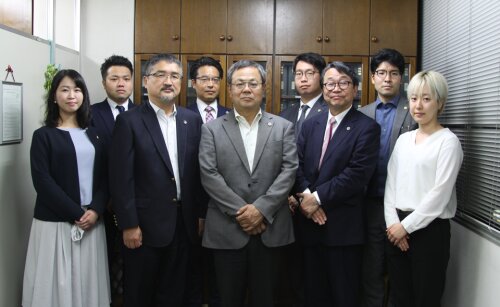Best Whistleblower & Qui Tam Lawyers in Shizuoka
Share your needs with us, get contacted by law firms.
Free. Takes 2 min.
List of the best lawyers in Shizuoka, Japan
About Whistleblower & Qui Tam Law in Shizuoka, Japan
Whistleblowing in Japan is governed mainly by national laws that protect people who report wrongdoing that affects the public interest. The core framework is the Whistleblower Protection Act and related statutes, which create protections for employees and others who report illegal acts, dangerous practices, financial misconduct, public-health hazards, and similar matters to the proper authorities. These laws are applied uniformly across the country, including in Shizuoka Prefecture, and are supplemented in practice by administrative procedures, agency hotlines, labor law remedies, and criminal or civil enforcement handled by national and local authorities.
The term qui tam refers to a specific type of whistleblower lawsuit found in some other jurisdictions where private individuals can sue on behalf of the government and potentially receive a portion of recovered funds. Japan does not have a qui tam mechanism equivalent to that found in the United States. Instead, whistleblowers in Japan work with administrative agencies, prosecutors, regulators, or civil courts to seek remedies, and monetary rewards for private relators are generally not available under national law.
Why You May Need a Lawyer
Whistleblowing can involve complex legal, evidentiary, and practical problems. You may need a lawyer if you face any of the following situations:
- You face or fear retaliation at work, such as dismissal, demotion, reduction in duties, pay cuts, or hostile treatment linked to your report. Legal advice helps you understand protection options and pursue damages or reinstatement.
- Your report involves possible criminal conduct, fraud, corruption, regulatory breaches, financial misconduct, or public-health threats that could lead to investigations or prosecutions.
- You want to report in a way that maximizes protection for yourself while preserving evidence and avoiding unlawful disclosure of trade secrets or personal data.
- You need help deciding which authority or agency is the appropriate recipient for a report, and how to frame the report so it is treated as a protected disclosure.
- You have been accused of wrongdoing after making a report, or you are concerned about defamation liability if you make a public disclosure.
- You want to negotiate an internal resolution with your employer, or pursue administrative remedies or civil claims for damages, injunctions, or reinstatement.
- Your matter involves specialized areas of law, such as financial regulations, pharmaceuticals, environmental law, or public procurement, where an experienced lawyer can interpret technical rules and guide interaction with regulators.
Local Laws Overview
Although national laws form the legal backbone, local practice in Shizuoka is shaped by available administrative offices, labor bureaus, police and prosecutors, and local government contact points. Key legal aspects you should understand include:
- Scope of protection: The Whistleblower Protection Act protects reports about violations of laws and regulations or threats to public safety and health. Both internal reports to an employer and external reports to the competent administrative agency can be protected if they meet statutory conditions.
- Prohibition of retaliation: Employers are prohibited from retaliating against whistleblowers. If you suffer illegal dismissal or other adverse treatment connected to protected reporting, you may bring a claim for compensation, rescission of dismissal, or reinstatement under labor law or administrative procedures.
- Confidentiality and privacy: Authorities and some employers are required to keep a reporter's identity confidential where possible. However, confidentiality is not absolute, and handling of personal information must also comply with Japan's data protection rules.
- Evidence and timing: Success often depends on contemporaneous documentation and clear links between the report and any retaliatory act. Statutory time limits and procedural steps vary by remedy - for example, labor disputes and civil claims have different limitation periods.
- Criminal and regulatory enforcement: If the facts indicate criminal offenses or serious regulatory breaches, reports usually go to police, public prosecutors, or the relevant regulatory agency in charge of that sector. Local Shizuoka offices of national agencies handle investigation and enforcement in the prefecture.
- No qui tam reward system: Japan generally lacks a private qui tam recovery framework. Monetary incentives for private whistleblowers are not a standard part of national enforcement. That means financial recoveries for the reporter are limited and usually come from negotiated settlements or civil damages, not a government-share model.
- Local support and procedures: Shizuoka Prefecture and municipal governments, labor bureaus, and the local bar association provide consultation services and referral channels. Sector-specific agencies - for example labor, consumer protection, health, finance, or environment - have their own reporting channels and procedures.
Frequently Asked Questions
What counts as a protected whistleblower report in Shizuoka and Japan?
A protected report is typically one that discloses illegal activity, regulatory breaches, corruption, danger to public safety or health, or other wrongdoing that affects the public interest. To be protected, the report should be made to a competent internal or external authority and be based on reasonable grounds for suspicion. The exact definition varies by statute and by the agency handling the matter.
Can I remain anonymous when I report wrongdoing?
Anonymous reporting may be possible with some agencies or internal hotlines, but anonymity can limit an agency's ability to investigate. Confidentiality protections generally require authorities and employers to avoid disclosing your identity, but absolute anonymity cannot be guaranteed in every investigative or legal context. Discuss confidentiality options with a lawyer before reporting.
Will I be protected from dismissal or other retaliation?
Yes, the law prohibits retaliatory dismissal and other adverse measures that are directly connected to protected whistleblowing. Remedies can include compensation, reinstatement, or orders reversing the punitive acts. Prompt legal advice helps preserve evidence and meet procedural requirements for a successful claim.
Can I get a monetary reward like in a qui tam case?
No general qui tam reward system exists in Japan. You should not expect a statutory share of government recoveries similar to some foreign regimes. Financial remedies, if any, usually arise from compensation for retaliation, civil litigation against wrongdoers, or negotiated settlements with employers or private parties.
Who should I report to in Shizuoka?
It depends on the subject matter. Labor and workplace safety issues normally go to the Labor Standards Inspection Office or the regional labor bureau. Health, pharmaceutical, or food-safety issues go to the health authorities. Financial misconduct is reported to regulatory authorities such as the Financial Services Agency or its local offices. Criminal activity can be reported to the police or public prosecutors. If unsure, contact the Shizuoka Bar Association or a local consultation office for guidance.
Should I use my employer's internal reporting system first?
Using internal reporting channels is often recommended because it can trigger compliance procedures and may be viewed favorably. However, if you fear cover-up, immediate danger, or retaliation, you may report externally to the relevant agency or the police. A lawyer can advise whether to report internally first or go directly to an external authority.
What kind of evidence should I collect?
Keep contemporaneous records, emails, documents, logs, memos, photos, or any material that supports your claim. Note dates, times, conversations, and witnesses. Preserve electronic evidence and avoid unauthorized disclosure of confidential third-party data. A lawyer can advise on lawful evidence collection and preservation.
Can contractors, consultants, or members of the public make reports?
Yes. While many protections are focused on employees, contractors, consultants, shareholders, and members of the public can often make reports to administrative authorities. The availability and extent of legal protection may vary depending on the statutory language and the circumstances of the relationship.
What risks do I face if my allegation turns out to be untrue?
If you make a report in good faith and with reasonable grounds, protections typically apply even if the allegation is not ultimately proven. However, knowingly false or malicious reports can lead to civil liability for defamation and, in some cases, criminal sanctions. Seek legal advice before making public accusations.
How long will the process take and what outcomes can I expect?
Timing depends on the nature of the allegation, the agency that receives the report, and whether the matter leads to administrative enforcement, criminal prosecution, or civil litigation. Some administrative reviews may take weeks to months; criminal investigations and prosecutions can take many months or longer; civil lawsuits follow statutory timetables and may take years. Typical outcomes include administrative sanctions, criminal charges, internal disciplinary actions, settlement agreements, or civil remedies for retaliation.
Additional Resources
When seeking help in Shizuoka, consider contacting the following types of organizations and offices for guidance or to make a report:
- Shizuoka Prefectural Government consultation and consumer affairs desks for local administrative assistance.
- Shizuoka Labor Bureau and local Labour Standards Inspection Office for workplace safety, labor rights, and employment-related reports.
- Local police stations or the Public Prosecutors Office for suspected criminal conduct.
- National regulatory agencies relevant to the sector involved - for example, agencies handling health, finance, environment, or consumer safety matters.
- Shizuoka Bar Association for referrals to lawyers who specialize in labor law, administrative law, criminal law, corporate compliance, and civil litigation.
- National or prefectural consumer centers and ombudsmen for consumer-related misconduct.
- Internal corporate compliance or external legal counsel with experience in whistleblower matters.
Next Steps
If you are considering reporting wrongdoing or need legal help in Shizuoka, take the following practical steps:
- Preserve evidence: Secure documents, messages, and records that support your concerns. Make secure copies and note dates and details of relevant events.
- Avoid illegal disclosures: Do not disclose confidential client data, trade secrets, or privileged information in ways that violate laws. A lawyer can help you balance disclosure and protection.
- Seek confidential legal advice: Contact a lawyer experienced in whistleblower, labor, administrative, or criminal law. The Shizuoka Bar Association can help with referrals.
- Decide on the reporting channel: With counsel, determine whether to report internally, to a local administrative agency, to regulators, or to the police, based on the nature and urgency of the issue.
- Document retaliation: If you experience adverse treatment after reporting, record the incidents, communications, and dates. Promptly consult a lawyer about remedies and procedures.
- Use available local support: Reach out to local consultation desks, labor bureaus, or consumer affairs centers in Shizuoka for practical guidance and to learn about agency procedures.
- Consider safety and personal consequences: If you face harassment or threats, prioritize your personal safety and notify law enforcement as needed.
Final note - this guide provides general information and is not a substitute for individualized legal advice. Whistleblower matters can be fact-sensitive and require case-specific strategy. Consult a qualified lawyer in Shizuoka as soon as possible to protect your rights and plan the best course of action.
Lawzana helps you find the best lawyers and law firms in Shizuoka through a curated and pre-screened list of qualified legal professionals. Our platform offers rankings and detailed profiles of attorneys and law firms, allowing you to compare based on practice areas, including Whistleblower & Qui Tam, experience, and client feedback.
Each profile includes a description of the firm's areas of practice, client reviews, team members and partners, year of establishment, spoken languages, office locations, contact information, social media presence, and any published articles or resources. Most firms on our platform speak English and are experienced in both local and international legal matters.
Get a quote from top-rated law firms in Shizuoka, Japan — quickly, securely, and without unnecessary hassle.
Disclaimer:
The information provided on this page is for general informational purposes only and does not constitute legal advice. While we strive to ensure the accuracy and relevance of the content, legal information may change over time, and interpretations of the law can vary. You should always consult with a qualified legal professional for advice specific to your situation.
We disclaim all liability for actions taken or not taken based on the content of this page. If you believe any information is incorrect or outdated, please contact us, and we will review and update it where appropriate.










